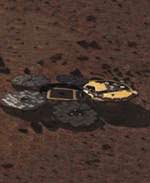
Image credit: Beagle2
Controllers initiated a state of radio silence with the Beagle 2 lander after it failed to report in, or communicate through Mars Express. In theory this radio silence should force Beagle 2 to enter into “Communication Mode 2”, where it attempts to call out constantly throughout the Martian day. The best opportunities to make contact with the lander will happen on the nights of January 24/25 when Mars Express passes over a significant portion of the landing area.
On 12 January a period of radio silence was initiated when no attempts were made to contact Beagle 2. Maintaining radio silence for a period of ten days is intended to force Beagle 2 into a communication mode that should ensure that the transmitter is switched on for the majority of the daytime on Mars and thus will improve the chance of the Mars Express orbiter making contact.
During this ten-day period Mars Express has listened for Beagle 2 but only for very short periods when Beagle 2 may not have been switched on.
The ten-day radio silence period ends today [22 January], just before a fly-over by Mars Express. However, it is not intended to hail the Lander immediately. This cautious approach is based on the fact that the end of the ten-day period of radio silence cannot be predicted with total confidence. This is because the absolute accuracy of the timer on Beagle 2 could have been affected by the temperature on Mars, making the clock run slightly faster or slower than predicted.
It has therefore been decided to choose a pair of opportunities when Mars Express flies over the Beagle 2 landing site, namely the nights of 24 and 25 January. These two flights cover the widest possible area where Beagle 2 should be, giving the best chance of calling the Lander and getting a response from the continuous transmission.
The results from these latest attempts to communicate with Beagle 2 will be announced by Prof. Colin Pillinger, Beagle 2 Lead Scientist and Dr. Mark Sims, Beagle 2 Mission Manager, on 26 January, at a media briefing to be held at The Science Media Centre, The Royal Institution of Great Britain, 21 Albemarle Street, London W1S 4BS, at 1400 GMT.
Original Source: PPARC News Release
